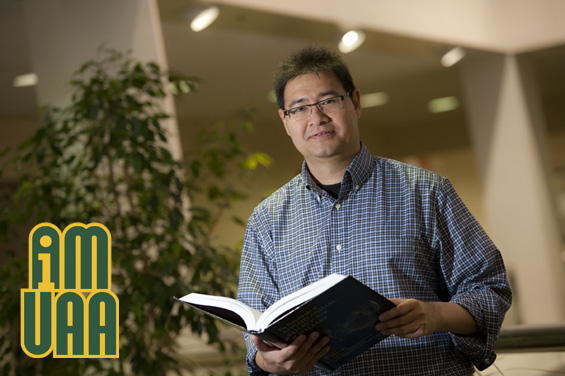I AM UAA: Raymond Anthony
by Kathleen McCoy |
Associate Professor of Philosophy
Hometown: Klang, Malaysia
Fun fact: Will begin a one-year sabbatical to Brazil and South Korea in July 2012
Sustainability is a buzzword these days, often utilized to motivate how "green" our habits are, how we fuel our vehicles and what we leave behind for the next generation. UAA philosophy professor Raymond Anthony challenges his students to appreciate the inextricable link between living sustainably and human flourishing.

"What does it mean to be a good human being but also be a good steward-not only for the different political or civic communities that we live in but also to be a good steward for the environment?" he asks, adding very unpretentiously, "An umbrella term could be something like 'sustainability.'"
And as we're all trying to approach this subject of sustainability so that it makes sense for our lifestyles, our businesses and our legacies, Raymond approaches it through the pragmatic questioning of human psychology, ethics and civic engagement.
"Philosophy, I think, can help us think through some very important questions carefully and equitably," he explains. "I am interested in the connectedness of environmental, food, animal and agricultural ethics. I also specialize in the philosophy of technology-the necessity of looking at technology as a way to help us feed what is now 7 billion people on this planet."
It is with this balance of asking the hard questions while finding practical, real solutions that Raymond focuses his energy and scholarship. And if we trace his roots to Malaysia, it's easy to see why.
"Growing up in Malaysia," Raymond explains, "food wasn't just a way to get full. It wasn't a chore; it was a way to invite somebody else into your space. Philosophically here, I take my cue from philosopher Albert Borgmann who challenges us to consider our 'culture of the table.' All of us need to eat. And thinking carefully through our relationship to the land and to food helps us better think about our moral connection to other people."
He describes Malaysia as a melting pot of diversity and it was thinking about people relationally that brought him to the U.S. 20 years ago, wanting to study psychology. He attended Millikin University in Decatur, Illinois, and ended up double majoring in psychology and philosophy as a precursor to his doctoral work in philosophy at Purdue University. Before heading off to graduate school, however, he worked as a child development specialist for a year and a half in an early intervention program for Macon County, Ill.
"Working with children and their families as a specialist was one of the best decisions I ever made," he says. "I got to see real people and real issues. It gave me an appreciation for and new perspective on life. But psychology alone wasn't answering all the questions I had."
At Purdue, he started out focusing on the philosophy of mind, working his way into both animal and food ethics. Still being influenced by his background in psychology as well, though, it was philosophy in the context of civic responsibility that really struck a cord in him. From Purdue to the University of British Columbia (UBC) to Iowa State and back to UBC, Ray honed his critical thinking skills, an understanding of sustainability issues over human history and his own style of teaching, which inevitably led to other questions such as "How can I empower students as our next generation of citizens and leaders? How can I make my classroom relevant and important to them personally and professionally?"
In August 2005 he found his next teaching opportunity in Alaska at UAA, where he says he is in close proximity to see the interconnectedness of food, ethics, climate change and pioneering unfold. And in being surrounded by "really, really good people [namely, his awesome colleagues in the philosophy department and across campus], who are dedicated to excellence in education," he has been refining his own personal philosophy on teaching. He calls it the "three Es": Empowerment, Engagement and Excellence. "Empowering and engaging students in their civic communities for excellence in outcomes of product and character." This biggest lesson he has learned: "If you spend quality time with students, they will respond positively."
Or maybe that is a lesson he brought with him to UAA. Both of his parents were teachers in their own right (his dad a conductor and music teacher and his mom a high school and college educator) and he saw at a young age and well into their retirement the impacts they've had on their students. And also from his parents he gained a strong appreciation for diversity-his mom is of Chinese and Vietnamese descent and his dad is of Indian and European descent. He learned how to foster good relationships with people and knows that real work is done through personal interaction with a sensitivity to diverse ways of knowing. Yes, all of that he brought with him to UAA and put it to work.
"I've been very fortunate," he says. "I've seen the power of what my professors did in promoting me and shaping my continued engagement in education. It's a lifelong learning process. Hopefully I am promoting a similar value set in my students that will be perpetuated." A culture of learning and community that is, well, sustainable, if you will.
Find more on Dr. Anthony's scope of work in his faculty bio, including undergraduate researchers, recent publications, community involvement and the Climate Ethics Works-in-Progress Conference he organized at UAA last fall.
 "I AM UAA: Raymond Anthony" is licensed under a Creative Commons Attribution-NonCommercial 4.0 International License.
"I AM UAA: Raymond Anthony" is licensed under a Creative Commons Attribution-NonCommercial 4.0 International License.









